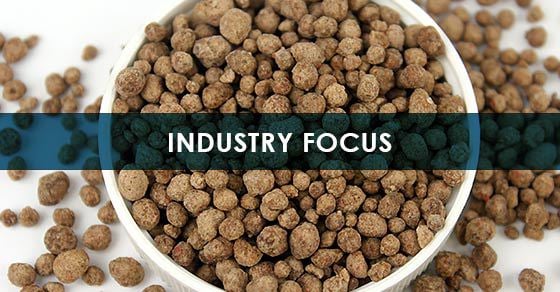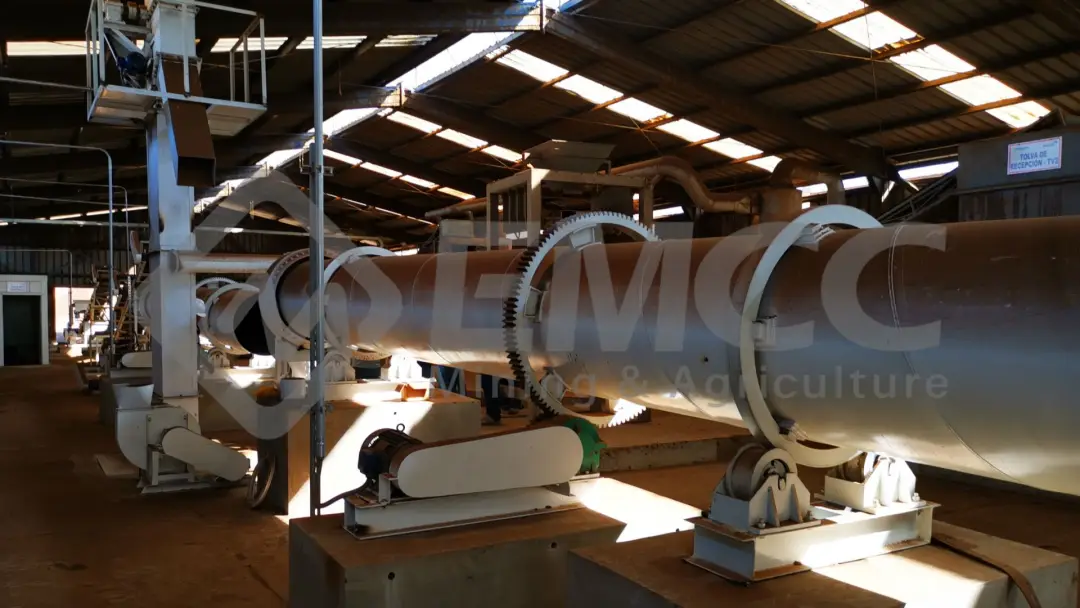 Product cooling is often a vital step in the production of fertilizers, helping to ensure product integrity and reduce potential hazards. Rotary coolers are the equipment of choice for fertilizer production plants, offering a host of benefits.
Product cooling is often a vital step in the production of fertilizers, helping to ensure product integrity and reduce potential hazards. Rotary coolers are the equipment of choice for fertilizer production plants, offering a host of benefits.
The following covers the important role cooling plays in fertilizer production, and why rotary coolers are best suited for the job.
THE ROLE OF ROTARY COOLERS IN FERTILIZER PRODUCTION
Not all fertilizer production lines employ a cooling step. Depending on the type of material, and downstream handling requirements, cooling is not always necessary. However, when certain conditions exist, product cooling is essential.
PROTECTING DOWNSTREAM EQUIPMENT & EMPLOYEES
As part of product finishing, fertilizer granules are dried, typically in a rotary dryer. Product exits the dryer at around 200°F, a temperature too high for bagging, storage, and some handling equipment, as well as any workers that might come into contact with the material.
By cooling product coming off the dryer, producers can avoid damaging downstream handling or bagging equipment, or posing a hazard risk to employees.
REDUCING THE POTENTIAL FOR PRODUCT CAKING
Product caking is extremely problematic for fertilizer producers, resulting in spoiled, lost, or devalued product, and potentially endangering workers in storage environments due to unstable pile formations. Caking also increases the potential for dust generation, a troublesome issue in its own right.
While caking is not a problem with all fertilizers, it is especially likely with hygroscopic fertilizers, or those that tend to absorb moisture from their surrounding environment. This is typical with potash, making caking reduction a top priority for potash producers.
Producers can reduce the potential for product caking by cooling their product. Cooling discourages the formation of crystal bridges at points of contact between particles – the starting point for caking.
THE ADVANTAGE OF ROTARY COOLERS IN FERTILIZER PRODUCTION PLANTS
While other cooler types are available, fertilizer producers usually prefer rotary coolers for handling this critical task. This is because they offer a few key benefits….
RELIABILITY
First and foremost, rotary coolers have a well-earned reputation for reliability, often operating consistently and without issue for decades when properly maintained.
In contrast, plate coolers, for example, are prone to build-up over time and need to be cleaned on a regular basis.
PROVEN AND ESTABLISHED TECHNOLOGY
Rotary drum technology has long been the cornerstone of fertilizer production; it is prolific throughout the industry as a proven and established technology. Plant personnel typically have a solid understanding of how to operate and maintain rotary equipment, and the equipment is well supported by rotary drum service companies and OEMs.
HIGH THROUGHPUT
Another reason why rotary coolers are preferred is their high throughput, a common requirement at fertilizer plants. Rotary coolers can process up to 200 TPH in many cases.
ROBUST BUILD
Fertilizer producers also appreciate the durability that comes with a rotary cooler; these machines are heavy-duty and built to withstand demanding process conditions day in and day out.
FLEXIBLE DESIGN
Fertilizer cooling is a fairly straightforward task. However, the flexibility rotary coolers offer in terms of drive assembly selection and customized flight/lifter design gives producers added control over process efficiency.
Both flight design and pattern can be customized to maximize air-to-material contact for optimal cooling efficiency.
TOLERANCE TO VARIATION
While variation in feedstock is not typically a concern for coolers in fertilizer production plants, the rotary cooler’s tolerance to changes in feedstock can sometimes still offer an advantage over other types of coolers. If for some reason feedstock conditions change or process fluctuations occur, the cooler remains largely insensitive, continuing to operate without issue and in most cases, still yielding a uniformly cooled product.
HOW ROTARY COOLERS WORK

EMCC’s Rotary Cooler
Rotary coolers operate on the same principles as rotary dryers, only instead of products of combustion, they use chilled or ambient air to reduce material temperature.
Unlike rotary dryers, where material and air can flow co-currently or counter-currently, rotary coolers always use a counter-current configuration for maximum heat transfer. Material is fed into one end, while the cooling air is fed into the other end. This counter-current air flow, in which the material and air flow in opposition to each other is most efficient, resulting in lower operating costs, a cooler discharge temperature, and even a reduced burden on the dryer.
As material is fed into the rotating cylinder, flights fixed to the interior of the drum shell pick up the material, carry it over, and drop it through the chilled air, creating a “curtain” or cascade of material in order to maximize contact between the solids and air.
ROTARY COOLER DESIGN
While the cooling process requires comparably less engineering than the drying process, cooling must still be carried out properly to avoid excessive energy costs and to ensure product integrity. This requires an expert to properly design the rotary cooler.
Designing a rotary cooler for maximum efficiency and longevity centers around tailoring the design to the specific characteristics and demands of the material to be cooled. This includes taking into account factors such as bulk density, particle size distribution, fragility, heat transfer properties, and more.
By incorporating these factors into the design, engineers can size the drum and tailor its many components for an optimized cooling solution.
CONCLUSION
While cooling is not always required in fertilizer production plants, when caking or risk to downstream equipment or employees is in question, it is an essential step in product finishing.
Highly reliable, proven technology, and flexibility in design, combined with a high throughput and tolerance to variation, rotary coolers provide fertilizer producers with an ideal industrial cooling system.
EMCC has been supplying the industry’s most prestigious rotary coolers for over 10 years. All EMCC coolers are designed based on the materials being processed to provide efficient and durable processing solutions. We also offer an extensive parts and service program to keep rotary coolers, as well as other types of rotary drums used in the fertilizer industry, in top operating condition. To learn more about our rotary coolers or services, contact us today!



